In the modern world that I live in, it seems that people are connected all the time because of Internet and technology. We are all used to communicate through phone, email, instant messages, Facebook, and all kinds of social media. But at the same time, I often feel more and more isolated from other people. When I open my Facebook or Wechat (Chinese Facebook), I can see people posting pictures and statuses all the time, but I don’t know the stories and real emotions behind them. It is almost impossible to have a real conversation or build relationships through social media when our thoughts are shortened into a few sentences or words. Even when we sit together with friends or family at the same table, we are still often distracted by our phone and forget about the real people in front of us. What does it mean to be truly connected? I think I have found the answer this month.
This month, I have been soaking myself in a completely new environment, meeting people from all kinds of backgrounds, having face-to-face conversations with them, and developing relationships with them in a meaningful way. In this blog post, I want to write about two fascinating people that I have met this month and my take-aways from them because writing down these stories and reflections help me remember these interesting people and the precious moments we shared together. Even though I might not know them very well and might never see them again, the time we spent together are all moments of truth (After spending a magical day with Kiyoshi Tezuka, I have been thinking about what is “a moment of truth”. I will share his stories soon).
Kiyoshi Tezuka
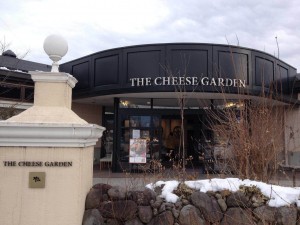
The Cheese Garden in Nasushiobara
Kiyoshi is my classmate Greg’s neighbor’s brother, who is the owner of “the Cheese Garden” — a famous cheese factory in Japan. My friends Greg, Nate, Jordan, and I visited him last Saturday. Before we went there, we thought we would just have an ordinary tour of Kiyoshi’s cheese factory and taste some cheese or cheesecake there. But that day became an unexpected adventure and too magical to believe that it was real. I will not go into the details of that day because I am not good at telling stories, and it would probably not feel that magical if I list what happened one by one. Plus you might get too jealous of what I ate that day if I start to talk about the food we ate. (Oh yes, I had the best cheesecake and steak in my life).
What I want to share most is the philosophy behind Kiyoshi’s Cheese Garden. Kiyoshi founded the Cheese Garden when he was 25, in 1984. To me, he is not just the owner of a cheese company, but an artist and philosopher. When we had dinner together, he told us that he was not just selling cheesecake. (You might wonder: Wait, what are you talking about? The Cheese Garden does not sell cheesecake?). Don’t worry. Let’s take a minute to think about the company’s name first. Why is it called Cheese Garden instead of Cheese factory?
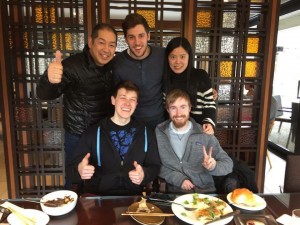
First row: Greg, Jordan. Second row: Kiyoshi, Nate, me. (From left to right)
In my class, we have been discussing what is good food. According to Fukuoka, the author of One-Straw Revolution, food is food and food is not food. To Kiyoshi, the concept behind food is most important. When he sells cheesecake, he is actually sending the messages behind cheesecake. In Kiyoshi’s office, there is an hourglass on his table and a few maps on the wall. Hourglass symbolizes that life has limited time. Map represents travel and journey. Kiyoshi believes that life is an infinitely delicious adventure. Every year, Kiyoshi and the staff members at the Cheese Garden come up with different themes for the food they sell. This year’s theme is curiosity and last year’s is a moment of truth. At dinner, when we were all amazed by the food and the philosophical ideas behind the Cheese Garden, Kiyoshi said, “ The time we spend at dinner right now is a moment of truth. Our time together is short. We should cherish it. ” Greg, Jordan, Nate and I indeed cherish that fabulous day deeply and we have been processing Kiyoshi’s thoughts in mind since that day.
Kiyoshi also told us that he became interested in Zen Buddhism because of his wife and father-in-law. His father-in-law is a Zen master, who has had a huge influence on Kiyoshi’s attitude towards life. Kiyoshi told us that in the first 20 years after he started the Cheese Garden, all he wanted was money, money, and money. Then he got tired of that lifestyle and started to think about the true meaning of life. 10 years ago, he began to sell the messages behind the food and incorporate Zen Buddhism into the Cheese Garden. Now Kiyoshi has four priorities in life: food, family, work, and the earth. Making money has been put to the end. He thinks that money will come naturally if he lives a meaningful life. Not surprisingly, the sale of his cheesecake doubled since then.
Kiyoshi and the story behind his cheesecake are truly incredible, aren’t they? When I’m writing this blog post and reflecting on Kiyoshi’s words now, what he said all make sense to me now. Even though we only spent one day together, I will always remember those precious moments of truth and serendipity. Additionally, Kiyoshi totally changed my stereotypes of businessmen and the so called business world. Businessmen are not all about earning profits. Look at what Kiyoshi is doing. It is possible to live up to ones’ ideals, change other people’s attitudes and give them life guidance by selling cheesecake!
The Cheese Garden is truly a garden of wisdom and spirits.
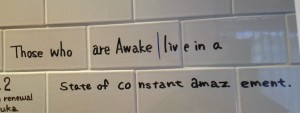
Kiyoshi’s motto: “Those who are awake live in a state of constant amazement.”
Khaling Toshang
A few days ago, I interviewed Khaling for my class assignment. Getting to know Khaling is one of the most meaningful moments in my life. As a college senior with deep passions and frustrations but not many life experiences, I cannot describe how much her stories mean to me and how much I appreciate this interview opportunity. Khaling is a truly incredible person. Her suffering and compassion for her people and community touch my heart deeply. What does it mean to be a leader? Many people might have different answers. But Khaling’s courage and sense of responsibilities make her a true servant leader.
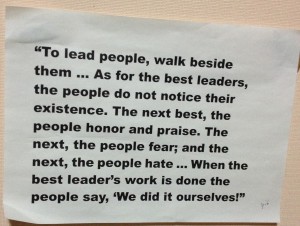
What I found in Khaling’s dorm room
Khaling is from Manipur, an area that has suffered from war and conflicts for decades. Manipur is located in northeastern part of India and right next to Myanmar. Khaling became a victim of war at 10 years old and stayed at a refugee camp from 10 to 19 years old. Her house was burned down by the major tribal group three times in total. In 2007, she came to Japan and tried to learn everything from ARI’s training program. After that, she went back to Manipur and started an NGO, Dorcas Noble Fund. Since then, she has been involved in a peace movement in her community. She came back to ARI last year as a teaching assistant, but her main goal is to update her knowledge and skills so that she could serve her community better.
Khaling’s NGO currently has 7 voluntary staff members and it works on a variety of issues, including: 1) Finding water and wells for local villagers; 2) Introducing appropriate rural technology and permanent farming; 3) Teaching children to stop using guns; 4) Helping children gain more knowledge and educational rights; 5) Giving free clothes to orphans, helpless children and widows; 6) Raising awareness on human trafficking and save children from restaurants and hotels by collaborating with the local government; 7) Empowering rural women and promote gender equality through the “Woman in Governance ” project.
Everything is easier said than done. It is easy to say that I care about the world or I want to make the world a better place. In reality, few people have the courage to take on the challenge when they realize how difficult it is to solve a societal problem. Many people quit in the middle and choose to live a more comfortable life. Khaling does not just speak about peace and social justice. She lives up to her ideals on a daily basis and tries to solve the problems in her community step by step. She is doing everything she could to serve her people and community, taking all the responsibilities and risks under extremely difficult circumstances. She and her daughter often had to hide in churches to escape from shooting. When I asked her why she didn’t want to move to a safer environment. She said, “I need to stay in my community and protect my people. I don’t know why I don’t want to move to a safer area. I just want to serve my people. If troubles occur, I try to run away. But I am willing to sacrifice myself for my people and my community. ”
I often get frustrated when I learn about social problems and conflicts in the world. Sometimes I think too much and carry too much emotional burden on myself. However, I feel that I am extremely privileged because I have never experienced any real hardships in my life. My emotional burden is nothing compared to Khaling and all the people who are suffering from war, hunger, and experiencing the difficulties and constant life threats every day. I am also not brave enough to sacrifice my life or freedom for other people yet. Even though I care deeply about human rights and social justice, I cannot take all the risks because I have to think about my parents and people who love me. I am the only child in my family, and my life is not only my life.
There are many ways of dealing with social problems without sacrificing our lives. But sometimes we worry too much about the risks and at the end cannot accomplish anything. In the past, I have tried to post things on social media and participated in demonstrations. A friend said to me, “Are you stupid? Don’t do that. If the government finds out about it, your future is screwed.” So I stopped posting any criticisms of the government on social media for a while. When I said I wanted to promote social justice or change the educational system in China, another friend told me, “You are too idealistic and sometime naive. If you don’t have any social influences or power, no one would listen to you. You can’t do anything.” So at one point I told myself that I had to get a PhD degree in order to have some expertise in the field and gain more social status. I thought maybe after that, people will listen to me. (My thoughts have changed over time and now I don’t think PhD is necessary)
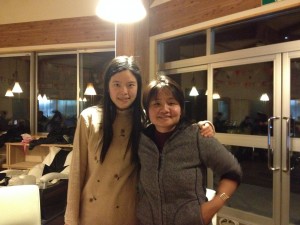
Khaling and me at ARI
But Khaling did not study social sciences or have any social influences at all when she started her NGO and the peace movement. It must have been extremely difficult for her to let people listen to her and follow her in a male-dominated society. But she just followed her heart and started to take action anyways. Through helping the villagers find water, she built the relationships among different tribal groups and gained people’s trust gradually. People at ARI didn’t know anything about radiation when the nuclear disaster happened in Japan in 2011. But they took on the challenge and tried to find out the solutions by asking the experts, engaging with the local citizens, and measuring the radiation level in soil, crops and vegetables by themselves. Therefore, we don’t really need to have everything in hand when we want to solve a problem. We can learn and improve along the way.
More importantly, no one can solve the problems alone. If there is a challenge, we need to take an initiative and find a right group of people and organizations to support us. We need to find people who have different expertise and skills, and build relationships with them. Khaling has proved that passion, courage, action, and dedication are essential to promote social change and bring peace to the world, regardless of how little or powerless we are. In Chinese, there is a saying: nothing in the world is difficult if you put hearts into it (世上无难事,只怕有心人).
Note: Khaling is dedicated to spreading awareness of the social problems in Manipur among the international community. If you are interested in learning more about Khaling’s stories and her NGO, feel free to ask me for the whole interview write-up. My email address is wangda@stolaf.edu.
A Little Story About Myself
It seems necessary to share my own story because I wouldn’t have enjoyed this month so much if I had not changed my attitudes toward people around me in the last few years. When I first came to the U.S. four years ago, I did not know how to hang out with my American roommates and friends at all. In my freshman year, I was extremely quiet and shy. My English was very broken. When I sat with a group of American students in the cafeteria, I felt that I could not fit in because I did not understand them very well. I stayed in the library all the time and tried to avoid communicating with people in English. I did not feel comfortable to stay in my dorm room because it was awkward to not say anything when my roommates were around. I had never lived at a boarding school before college, so it was challenging for me to adjust to the residential life at St. Olaf and live with people that I had never met before. I also could not understand why my peers liked parties so much. To me, staying alone was much easier than socializing with other people.
Growing up, I was not a quiet person. I enjoyed hanging out with my friends and family in China. But after I came to the U.S., everything around me was brand new and sometimes strange, so I tried very hard to make sense of the world around me and figure out my place in it. It was extremely challenging to use a non-native language all the time. I guess that’s why I was so quiet because it took too much effort to talk about my daily life and explain my thoughts clearly in English. Even though my English got better as time went on, I still often feel like an outsider in the U.S. because my background is completely different than most of my classmates and friends. Sometimes I get tired of not understanding inside jokes and not knowing the American culture or the American way.
In the last few years, I have opened myself up and stepped out of my comfort zone little by little. I have convinced myself, it is OK to be different and all the challenges would help me become a better person. Life would have been so tedious if everyone around us were the same or shared similar experiences. Now I really appreciate the diversity in the world and enjoy meeting new people from all kinds of backgrounds, even though developing relationships can be hard and time-consuming. This month in Japan, I have pushed myself very hard to engage in a variety of activities and getting to know new people constantly. Since my class and ARI focus on community building, my classmates and I spend most of our time with each other and new people we met through working, cooking, eating, and living together. It is a little bit overwhelming, because as much as I like getting to know people, I still enjoy having my own quiet time to reflect on things. But the positive side is that I met many cool people whom I wouldn’t have met if I were alone. They not only broadened my horizon but also challenged my stereotypes. More importantly, they made me feel truly happy inside. It is very rare and precious to find a group of people with whom I can share my deep concerns and passions. I feel truly connected when these rare moments happen.
During the international panel at ARI, I also learned that a moment of truth is to step outside of our comfort zones. Uncle Timo said, “challenge is a learning process. You should always think outside of the box and try to expand your way of thinking. Maybe you are fortunate to be born in America, but you should think about other people’s lives. See people with eyes of similarities because these common things in humanity can bond us together and create peace. ” Kathy also said, “I challenge you to be in communities that are different than your own. Don’t stay in your own ethnic groups or world. Don’t stay in your comfort zones”. (Timo is an ARI graduate from Ghana. He is currently working at ARI as a TA. Kathy is an ARI staff member from the U.S.).
Dear readers, what does “a moment of truth” mean to you? What are some moments of truth you have had this month?
The End
In this blog post, I originally planned to write about my classmates, ARI staff members, and the Japanese and Taiwanese friends I met in Nagawa-machi. However, when I started to make a list of people that I found interesting, I realized that every one of them had something unique and precious. If I had written down all of them, the blog post would have been too long. So I want to say to them and my professor KTP: Thanks for being amazing and making this month of my life unforgettable. Thanks for making me laugh, pushing me to work hard, and challenging me to think hard about who I am, what food and resources I rely on daily, and what matter in life in various ways. My heart and mind are full. I will cherish all the funny or deep conversations we had together and keep the memories at the bottom of my heart.
I want to end this blog post by saying what I had said before in Nagawa-machi: In the past and the contemporary world, there have been too many conflicts and problems among different nations and ethnicities. “We” are always separating ourselves from the “others”. But there is hope. I’ve seen hope this month. The individual relationships we build matter, because they can help break and even transcend the barriers among us. No matter how different we are, we may live together, work together, study together, and laugh together.
That We May Live Together
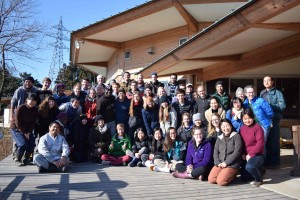
“The mission of the Asian Rural Institute is to build an environmentally healthy, just and peaceful world in which each person can live to his or her fullest potential… We present a challenge to ourselves and to the whole world in our approach to food and life”

Recent Comments